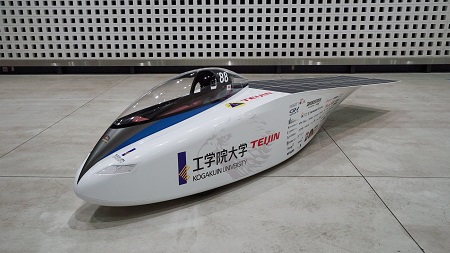The Teijin Group announced that its advanced high-performance materials and technologies will once again be used in the latest solar-powered, carbon-fiber-reinforced plastic (CFRP) vehicle developed by the Kogakuin University Solar Team for the Bridgestone World Solar Challenge, the world’s biggest biennial solar car race, which will take place in Australia from October 13 to 20.
The Teijin Group, which the Kogakuin University’s Solar Car Project in 2013, is supporting the team for its fourth consecutive year. Collaborating with the university as a partner in developing innovative, next-generation automobiles, Teijin is providing technical support for solar panels and other components in the solar car, as well as conventional support for a wide range of materials and products designed to maximize the comfort and performance of the team members.
GH Craft Ltd., Teijin’s composite-structure design, development and evaluation unit and a leader in CFRP composite structures, is engaged in all facets of composite-structure fabrication for super-lightweight vehicles, including design, molding and structural evaluation. The company is providing the Kogakuin University Solar Team with expert technical support, including a technician who will provide in-race mechanical and technical backup, aiming to help the team achieve its first victory in this challenging race.

The car will use high-performance materials and technologies from Teijin and its fibers and products converting company, Teijin Frontier Co., Ltd., including the ultra-lightweight fabric made with Tenax® carbon fiber for the body. Teijin and Sakai Ovex Co., Ltd. developed the ultra-lightweight, 0.06-mm-thin carbon fiber fabric in 2010, which will be incorporated in the car’s CFRP body. Panlite® polycarbonate (PC) resin will be used for the windows to reduce body weight and improve driver safety. Compared to glass, Teijin’s Panlite® is 200 times more impact-resistant and weighs only half as much. Technora® para-aramid fiber prepreg is applied in the wheel wells for lower air resistance to reduce vehicle weight and add durability. Teijin’s Technora® para-aramid fiber boasts eight times the tensile strength of steel and yet is just one-fifth the weight. Vertically lapped nonwoven polyester fabric is applied in the seat cushions to minimize weight while enhancing rider comfort. It is Teijin Frontier’s nonwoven fabric made of fibers oriented vertically (upward) to make it resilient, breathable and lightweight. Nanofront® ultra-fine polyester fiber is used in the team’s driving gloves for extra-positive steering. Teijin Frontier’s Nanofront®, which has just 1/7,500th the cross-sectional area of human hair, fits snuggly and improves gripping, breathability and moisture permeability. Teijinconex® meta-aramid fiber, a heat-resistant and flameproof material, has been adopted for the team’s driving suits to help protect riders from the harsh race environment, including possible fire in the case of an accident. Deltapeak® hybrid polyester fabric is incorporated in the team’s uniforms for excellent comfort and fit to keep the team fresh after many hours of preparation and racing. Teijin Frontier’s Deltapeak® offers softness and durability as an anti-snagging, stretchable, breathable and lightweight fabric.
The Teijin Group is striving to be a company that supports the society of the future by enhancing its capabilities to offer new solutions for automotive applications. As part of this effort, the company is delighted to once again support the ambitions of young engineers on the Kogakuin University Solar Team. Hereafter, Teijin will continue to develop advanced technologies for lightweight vehicle design and molding as well as solar power to help solve issues that the world’s automotive society will face going forward.
The Bridgestone World Solar Challenge, which was inaugurated in 1987, will hold its 15th competition this year as the world’s biggest biannual solar car race to showcase advanced, innovative technologies for solar cars. The Kogakuin University Solar Team is entered in the competition’s Challenger Class with 52 competitors from 24 countries.














